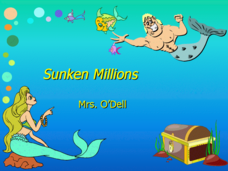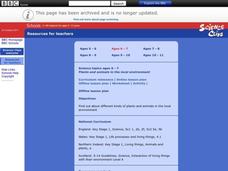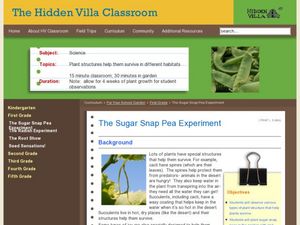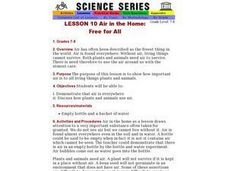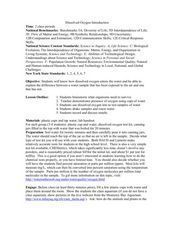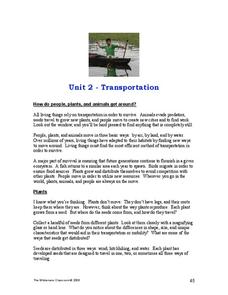Curated OER
Weather and Water in Ghana
Learners research the rainy and dry season to investigate Africa's weather. In this African weather lesson, students use the given websites to research the rainy and dry seasons of Ghana in Africa. Learners then read stories about life...
Curated OER
I See a Coyote
Students role-play coyotes looking for natural resources. In this natural resources lesson, students examine the relationship between animal life and the environment. Students play a game that demonstrates how natural resources affect...
Pennsylvania Department of Education
Wind and Water Wheels
Students identify wind and water as natural resources that create energy. In this natural resources and energy use lesson, students work in groups to construct a pinwheel, then explore the effects of wind and water on the pinwheel....
Curated OER
Sunken Millions
This PowerPoint provides a game show format with multiple choice questions about fresh and salt water. Topics include sources of water, water geography, uses of water, and the water cycle.
Curated OER
World of the Pond
Field trip! The class will review what they know about organisms that dwell in freshwater ponds, then trek down to the old water hole to collect specimens for examination. This includes several web links, useful tips, and an excellent...
Curated OER
Mealworms
Crawl into the world of the darkling beetle with this scientific investigation. Watch as the insects move through the larval, pupal, and adult stages of life, recording observations along the way. Discuss the necessities of life as young...
Curated OER
Plants And Animals in the Local Environment
Students observe the various living things they can find outside their playground making sure to look both on the ground and in the air. They develop a large poster Venn digram, as a class, of plants and animals that live in the air, on...
Curated OER
The Sugar Snap Pea Experiment
Students examine types of plant structure. In this plant biology lesson, students observe various types of plants, such as ivy and grapes, and discuss the differences in structure. Additionally, students plant sugar snap peas, using a...
Curated OER
Fire Fighting
Students consider the effects of a wildfire on prairie life. They explore the ways that plants regenerate after a fire and create fictional plants that have adapted specifically to the prairie environment. They share models of their plants.
Curated OER
Growing Jack and the Beanstalk Plants
First graders investigate how plants grow by growing their own "beanstalk", (after reading "Jack and the Beanstalk") and record their observations daily in a science journal.
Curated OER
Let's Think About Air
Students explore the concept that air is all around us and identify ways that we can use air, and what air can do. They watch a short video that illustrates some of their findings.
Curated OER
Air in the Home: Free for All
Students explain that air is everywhere and discuss how living things use air.
Curated OER
Water Quality Monitoring
Students comprehend the four parameters of water quality. They perform tests for salinity, dissolved oxygen, pH and clarity or turbidity. Students comprehend why scientists and environmental managers monitor water uality and aquatic...
Curated OER
Let's Think About Water
Students explore the different forms that water can take and conduct simple experiments to demonstrate some of its properties in each state. They watch a short video that illustrates some of these concepts.
Curated OER
Be Kind to Mother Nature!
A clever worksheet on identifying things that harm the environment is here for you. Elementary schoolers read a short paragraph describing the harm that can come to the environment due to human activities. Then, they must circle five...
Chicago Botanic Garden
Seed Dispersal and Plant Migration
There are five methods of seed dispersal. They include gravity, mechanical, animal, water, and air. Scholars study seed dispersal in lesson five of the series of six. Through discussions, hands-on analysis of different seed types, and...
Curated OER
Dissolved Oxygen Introduction
Students are shown how dissolved oxygen enters the water. They are taught the difference between a water sample that has been exposed to the air and one that has not. Students brainstorm what organisms need to survive. They use dissolved...
Alabama Learning Exchange
Nature's Life Cycle
Become a member of the Pollution Patrol and stand up to litter! After discussing the life cycle of seeds and discussing how plants figure into the food chain, young conservationists engage in several activities involving podcasts,...
Curated OER
Life on the Surface of the Earth
Young scholars discover that life occurs on or near the surface of the Earth in land, air, and water. They read the literature selection, 'Whose Forest Is It?'
and discuss with students that there are examples of of many living...
Curated OER
Transportation
Students read about various modes of transportation for people, plants, and animals. In this transportation lesson, students read information about the transportation modes for people plants, and animals using water and land. Students...
Curated OER
Oxygen Levels and Aquatic Plants and Animals
Students design an experiment to test the effects of a change in the amount of dissolved oxygen of water on aquatic plants and animals. Questions are offered for exploration and experiment design. Results are tabulated and conclusions...
Curated OER
The Way a Tree Works
Learners explore nature by conducting botany experiments. In this plant life lesson, students define the necessary resources for a plant to thrive on our planet while defining scientific vocabulary terms. Learners utilize different plant...
Curated OER
Runoff: Intro to Watersheds
Learners are taught that a watershed is, what types of basic land cover are impermeable and permeable to water. They trace the flow of water around their school and around their home. Students determine what watershed their school is a...
Curated OER
How Much Water is in That River?
Students practice measurement using the Hudson River. They calculate the discharge measurement at a location on the Hudson River using ingenuity and a topographic map.





